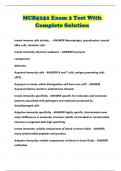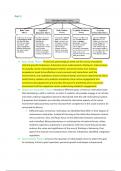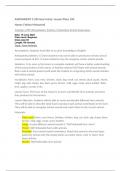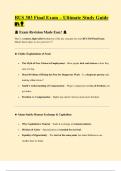Human learning 8th edition
Inhoud
Chapter 1 – Perspectives on learning.....................................................................................................6
The importance of learning................................................................................................................6
Defining learning................................................................................................................................6
Types of learning research..................................................................................................................6
Learning principles and theories.........................................................................................................7
How theories of learning have evolved over time..............................................................................7
Advantages of theories.......................................................................................................................8
Potential drawbacks of theories.........................................................................................................8
Applying knowledge about learning to instructional practices...........................................................8
Chapter 3 – Behaviorist principles and theories.....................................................................................8
Basic assumptions in behaviorism......................................................................................................8
Classical conditioning (Ivan Pavlov)....................................................................................................9
Classical conditioning in human learning............................................................................................9
Common phenomena in classical conditioning..................................................................................9
Eliminating unproductive classically conditioned responses............................................................10
Operant conditioning........................................................................................................................11
Important conditions for operant conditioning to occur..................................................................11
Contrasting operant conditioning with classical conditioning..........................................................11
Forms that reinforcement might take..............................................................................................11
Common phenomena in operant conditioning.................................................................................12
Effect of reinforcement schedules....................................................................................................13
Effects of antecedent stimuli and responses in operant conditioning..............................................13
Avoidance learning...........................................................................................................................14
Punishment......................................................................................................................................14
Potentially effective forms of punishment.......................................................................................15
Ineffective forms of punishment......................................................................................................15
Chapter 4 – Applications of behaviorist principles...............................................................................16
Applying behaviorist principles to classroom management.............................................................16
Creating a productive classroom climate..........................................................................................16
Myths and misconceptions about reinforcement and punishment..................................................17
1
, Genuine concerns.............................................................................................................................17
Using reinforcement to increase productive behaviors....................................................................18
Strategies for decreasing undesirable behaviors..............................................................................19
Applied behavior analysis (ABA).......................................................................................................20
Frequently used ABA strategies........................................................................................................21
Using ABA with large groups............................................................................................................21
Positive behavioral interventions and supports (PBIS).....................................................................22
General implications of behaviorism for classroom instruction and assessment.............................23
Importance of making active responses...........................................................................................23
Identifying instructional goals and objectives...................................................................................23
Behavioral objectives........................................................................................................................24
Current perspective on instructional goals and objectives...............................................................24
Formulating goals and objectives at varying levels of complexity....................................................24
Promote mastery of basic knowledge and skills...............................................................................25
Programmed instruction and computer-assisted instruction...........................................................25
School assessment practices............................................................................................................26
When behaviorist approaches are most useful................................................................................27
Chapter 6 – Introduction to cognitive perspectives..............................................................................27
Basic assumptions in cognitive perspectives....................................................................................27
Overview of contemporary cognitive perspectives..........................................................................28
Information processing theory.........................................................................................................28
Individual and social constructivism (Piaget)....................................................................................29
Sociocultural theory (Vygotsky)........................................................................................................29
Contextual theories..........................................................................................................................29
De basic nature of human memory..................................................................................................30
The dual-store model; an overly simplistic and yet useful model of human memory......................30
Moving information to working memory; the role of attention.......................................................31
Working memory..............................................................................................................................32
Moving information to long-term memory; connecting new information with prior knowledge....33
Long-term memory...........................................................................................................................33
Challenges to the dual-store model..................................................................................................35
Alternative views of human memory...............................................................................................35
General educational implications of cognitivist approaches............................................................36
Chapter 7 – Long-term memory storage and retrieval processes.........................................................36
Storage as a constructive process.....................................................................................................36
Rote learning....................................................................................................................................36
2
, Meaningful learning.........................................................................................................................37
Imagery.............................................................................................................................................38
How procedural knowledge is acquired...........................................................................................38
Factors affecting long-term memory storage...................................................................................38
Long-term memory retrieval processes............................................................................................41
Importance of context for retrieval..................................................................................................41
Influence of emotions on retrieval...................................................................................................42
Construction in retrieval...................................................................................................................42
The power of suggestion; effects of subsequently presented information......................................42
Constructing entirely new ‘memories’ during retrieval....................................................................42
Remembering prior recollections.....................................................................................................42
Forgetting.........................................................................................................................................43
Promoting effective long-term memory storage and retrieval processes........................................44
Chapter 9 – Cognitive-developmental Perspectives.............................................................................45
Piaget’s theory of cognitive development........................................................................................45
Current perspectives on Piaget’s theory...........................................................................................47
Capabilities of different age-groups..................................................................................................47
Effects of experience and prior knowledge......................................................................................48
Effects of culture...............................................................................................................................48
Views on Piaget’s stages...................................................................................................................48
Neo-piagetian theories of cognitive development...........................................................................48
Case’s theory....................................................................................................................................49
Implications of plagetian and neo-piagetian theories......................................................................50
Chapter 10 – Sociocultural theories.....................................................................................................51
Vygotsky’s theory of cognitive development....................................................................................51
Key ideas in Vygotsky’s theory..........................................................................................................51
Comparing Piaget’s and Vygotsky’s theories....................................................................................52
Key theoretical differences...............................................................................................................53
Current perspectives on Vygotsky’s theory......................................................................................54
Adding a sociocultural element to information processing theory...................................................55
Educational implications of sociocultural theories...........................................................................56
An example: reciprocal teaching......................................................................................................56
An example: peer tutoring................................................................................................................57
Chapter 11 – Contemporary contextual frameworks...........................................................................57
Embodiment: thinking and learning as whole-body phenomena.....................................................57
Gestures (gebaren) as integral components of thinking...................................................................57
3
, Emotional contexts of thinking and learning....................................................................................58
How emotions influence and are subsequently influenced by cognitive processes.........................58
An example: anxiety and its effects..................................................................................................59
Immediate physical and social environments as contexts................................................................59
Culture as contexts...........................................................................................................................60
Societies as contexts.........................................................................................................................61
How various layers of context interact: bioecological systems theory.............................................61
Educational implications of contextual frameworks.........................................................................62
An example: class discussions...........................................................................................................62
An example: cooperative learning....................................................................................................63
An example: communities of learners..............................................................................................63
Chapter 12 – Metacognition, self-regulated learning, and study strategies.........................................63
Metacognitive knowledge and skills.................................................................................................63
Self-regulated learning.....................................................................................................................64
Roots of self-regulated learning.......................................................................................................64
Effective learning and study strategies.............................................................................................64
Development of metacognitive knowledge and skills......................................................................67
Epistemic beliefs...............................................................................................................................67
Developmental and cultural differences in epistemic beliefs...........................................................67
Effects of epistemic beliefs...............................................................................................................68
The intentional learner.....................................................................................................................69
Why students don’t always use effective strategies.........................................................................69
Promoting effective learning and study strategies...........................................................................69
Chapter 8 – The nature of knowledge..................................................................................................70
The various kinds of knowledge.......................................................................................................70
Long-term memory as a network.....................................................................................................70
Propositions and their interconnections..........................................................................................70
Parallel distributed processing.........................................................................................................71
Concepts...........................................................................................................................................72
Theories of concept learning............................................................................................................72
Factors facilitating concept learning.................................................................................................73
Schemas and scripts.........................................................................................................................73
Personal theories..............................................................................................................................74
Personal theories versus reality........................................................................................................74
Fostering theory development.........................................................................................................75
Worldviews.......................................................................................................................................75
4
, The challenge of conceptual change................................................................................................75
Promoting conceptual change..........................................................................................................76
Development of expertise................................................................................................................77
Generalizations about the nature of knowledge..............................................................................78
Chapter 13 – Transfer, problem solving, and critical thinking..............................................................78
Transfer............................................................................................................................................78
Types of transfer...............................................................................................................................79
Theoretical perspectives on transfer................................................................................................79
Factors affecting transfer..................................................................................................................81
Problem solving................................................................................................................................81
Early theoretical perspectives on problem solving...........................................................................82
Problem-solving strategies...............................................................................................................84
Meaningless versus meaningful problem solving.............................................................................85
Facilitating transfer and problem solving in instructional settings...................................................85
Critical thinking.................................................................................................................................86
Developmental, cultural, and individual differences in critical thinking...........................................87
Fostering critical thinking in the classroom......................................................................................87
Chapter 15 – Basic concepts and principles in human motivation.......................................................88
General effects of motivation...........................................................................................................88
Extrinsic versus intrinsic motivation.................................................................................................88
The interplay between motivation and emotions............................................................................89
Fundamental human needs..............................................................................................................89
Individual differences in motivation.................................................................................................93
Creating a motivating classroom environment.................................................................................94
Chapter 16 – Cognitive factors in motivation.......................................................................................94
Interests............................................................................................................................................94
Expectations and values...................................................................................................................95
Goals.................................................................................................................................................96
Attributions.......................................................................................................................................98
Effects of attributions.......................................................................................................................99
Factors influencing the nature of attributions................................................................................100
Explanatory style: mastery orientation versus learned helplessness.............................................101
Motivation and self-regulation.......................................................................................................102
Encouraging motivating cognitions.................................................................................................103
Two helpful mnemonics for remembering effective motivational strategies are: music and targets
........................................................................................................................................................103
5
,Chapter 1 – Perspectives on learning
The importance of learning
- Mother Nature has endowed us with something very special: an ability to acquire an
exceptionally large body of knowledge and a wide variety of behaviors, giving us a greater
degree of flexibility and adaptability than is true for any other species on the planet. Because
so little of our behavior is instinctive and so much of it is learned, we’re able to benefit from
our experiences.
- We human beings seem to inherit an ability to think and learn in ways that nonhumans
cannot. The particular environment in which we live has a huge impact on the knowledge
and skills we do and don’t acquire, of course, but our capacity to be versatile and adapt to
many different situations and environments far exceeds that of other animal species
Defining learning
- Learning is the means through which we acquire not only skills and knowledge, but also
values, attitudes, and emotional reactions.
- For purposes of our discussions in this book, we’ll define learning as a long-term change in
mental representations or associations as a result of experience.
o Learning is a long-term change. It isn’t just a brief, transitory use of information—
such as remembering a phone number long enough to call someone and then
forgetting it—but it doesn’t necessarily last forever
o Learning involves mental representations or associations—entities that reside inside
the head. Psychologists and neuroscientists haven’t yet pinned down exactly what
one or more forms these entities might take, but presumably they have their basis in
the brain.
o Learning is a change as a result of experience, I mean some sort of new information
that a learner gains from the environment.
- Learning is sometimes a very passive process: It happens simply by virtue of something
happening to a learner. More often, however, it requires the learner to do something—
something physical, something mental, or, ideally, something both physical and mental.
However, some would prefer that the focus be on changes in behavior rather than on
changes in mental representations or associations.
Types of learning research
- The systematic study of behavior, including human and animal learning processes, has
emerged only within the past century or so, making psychology a relative newcomer to
scientific inquiry. But in a century’s time, countless research studies have investigated how
people and many other species learn.
- Basic research: They investigate specific learning processes under tightly controlled
conditions, often looking at people’s responses to contrived learning experiences in a
laboratory.
- Applied research: They investigate people’s learning in more “real-world” tasks and settings,
for instance by looking at how children learn certain science concepts in middle school
classrooms. The kinds of data collected vary from study to study as well.
- In some instances the data collected are quantitative, taking the form of measurements and
other numbers. In other cases the data are qualitative, in that they’re complex verbal or
6
, behavioral performances that a researcher must closely analyze and then judge for the
presence or absence of specific contents or skills.
Learning principles and theories
- Principles of learning identify certain factors that influence learning and describe the specific
effects these factors have. For example, consider this principle: A behavior that is followed by
a satisfying state of affairs—a reward/reinforcement—is more likely to increase in frequency
than a behavior not followed by a reward. Principles are most useful when they can be
applied to many different situations.
- When a principle such as this one is observed over and over again—when it stands the test of
time—it is sometimes called a law.
- Theories of learning provide explanations about the underlying mechanisms involved in
learning. Whereas principles tell us what factors are important for learning, theories tell us
why these factors are important. We have a possible explanation of why a reward affects
learning: It increases attention, which in turn brings about learning.
- Principles of learning tend to be fairly stable over time: Researchers observe many of
the same factors affecting learning over and over again. In contrast, theories of learning
continue to change as new research methods are developed, new research studies are
conducted, and new research findings come to light.
How theories of learning have evolved over time
- In the early 1900s, some psychologists began to criticize the introspective approach. They
proposed that to study learning in an objective, scientific manner, theorists must focus on
two things that can be observed and objectively measured: people's behaviors (responses)
and the environmental events (stimuli) that precede and follow those responses. Since then,
many psychologists have attempted to describe and understand learning and behavior
primarily through an analysis of stimulus–response relationships. Such psychologists are
called behaviorists, and their theories of learning are collectively known as behaviorism.
- In the 1940s, some psychologists proposed that people can also learn a new behavior simply
by watching and imitating what other people do. This idea of modeling provided the impetus
for an alternative perspective, social learning theory, that focused on how people learn from
observing those around them.
- Over time, as psychologists continued to explore the various forms that human learning
might take, it became clear that a study of behavior alone couldn’t give us a complete picture
of learning—that we had to take human thought processes, or cognition, into account as
well. A very different perspective emerged—one known as cognitive psychology or, more
simply, cognitivism—with objective, scientific methods for studying a wide variety of mental
phenomena. Social learning theorists, too, gradually incorporated cognitive processes into
their explanations of learning, resulting in a perspective now more often called social
cognitive theory.
- In the past few decades some psychologists have developed theories about the critical roles
that social interaction and cultural legacies play in human learning and cognitive
development, often referring to their perspectives as sociocultural theory.
- Such perspectives, which include sociocultural theories, are often referred to as contextual
theories. And when these perspectives encompass multiple layers of context, all of which
interact with one another in myriad ways, they are also known as systems theories.
- Some neurologists, cognitive psychologists, and scientists from other disciplines have teamed
up to discover how the brain influences people’s behavior and learning, and, conversely, how
people’s behavior and learning experiences can influence brain development. This rapidly
expanding field is known as cognitive neuroscience and has already made noteworthy
contributions to our understandings of the complexities of human learning
7
, - Great overview on page 10
Advantages of theories
- Certainly the changeable nature of theories can be frustrating, in that we can never be
confident that we have the ultimate truth—the real scoop—on how people learn.
- Theories have several advantages over principles.
- First, they allow us to summarize the results of many, many research studies and integrate
numerous principles of learning. In that sense, theories are often quite concise (psychologists
use the term parsimonious).
- Second, theories provide starting points for conducting new research; they suggest research
questions worthy of study.
- Third, theories help us make sense of and explain research findings. Research conducted
outside the context of a particular theoretical perspective can yield results that are trivial and
nongeneralizable; interpreted from a theoretical perspective, however, those same results
can be quite meaningful.
- Theories have a fourth advantage as well: By giving us ideas about the mechanisms that
underlie human learning and performance, they can ultimately help us design instructional
and therapeutic strategies and environments that facilitate human learning and
development to the greatest possible degree.
Potential drawbacks of theories
- First, no single theory explains everything researchers have discovered about learning.
Current theories of learning tend to focus only on certain kinds of learning.
- Second, theories affect the research findings that are published, thereby biasing the
knowledge we have about learning.
Applying knowledge about learning to instructional practices
- To maximize productive student learning, teachers must understand both the observable
factors that influence learning (principles) and the cognitive and social processes that
potentially underlie it (theories). Teachers must also draw on research findings regarding the
effectiveness of various instructional methods and strategies; that is, they must be
knowledgeable about evidence-based practices.
Chapter 3 – Behaviorist principles and theories
Basic assumptions in behaviorism
- Principles of learning should apply equally to different behaviors and to a variety of animal
species. mensen en dieren leren op dezelfde manier, dus ze spreken meer van
organismes.
- Learning processes can be studied most objectively when the focus of study is on stimuli and
responses.
- Internal processes tend to be excluded or minimized in theoretical explanations. we
kunnen die niet direct observeren, dus kunnen we deze processen beter weglaten uit
onderzoeken. organisme is ‘black box’ stimuli + response, maar die dingen die daartussen
gebeuren blijven en mysterie. (Some behaviorists have acknowledged that they can fully
understand both human and animal behavior only when they consider cognitive processes as
well as environmental events neobehaviorism (S-O-R theories))
- Learning involves a behavior change.
8










